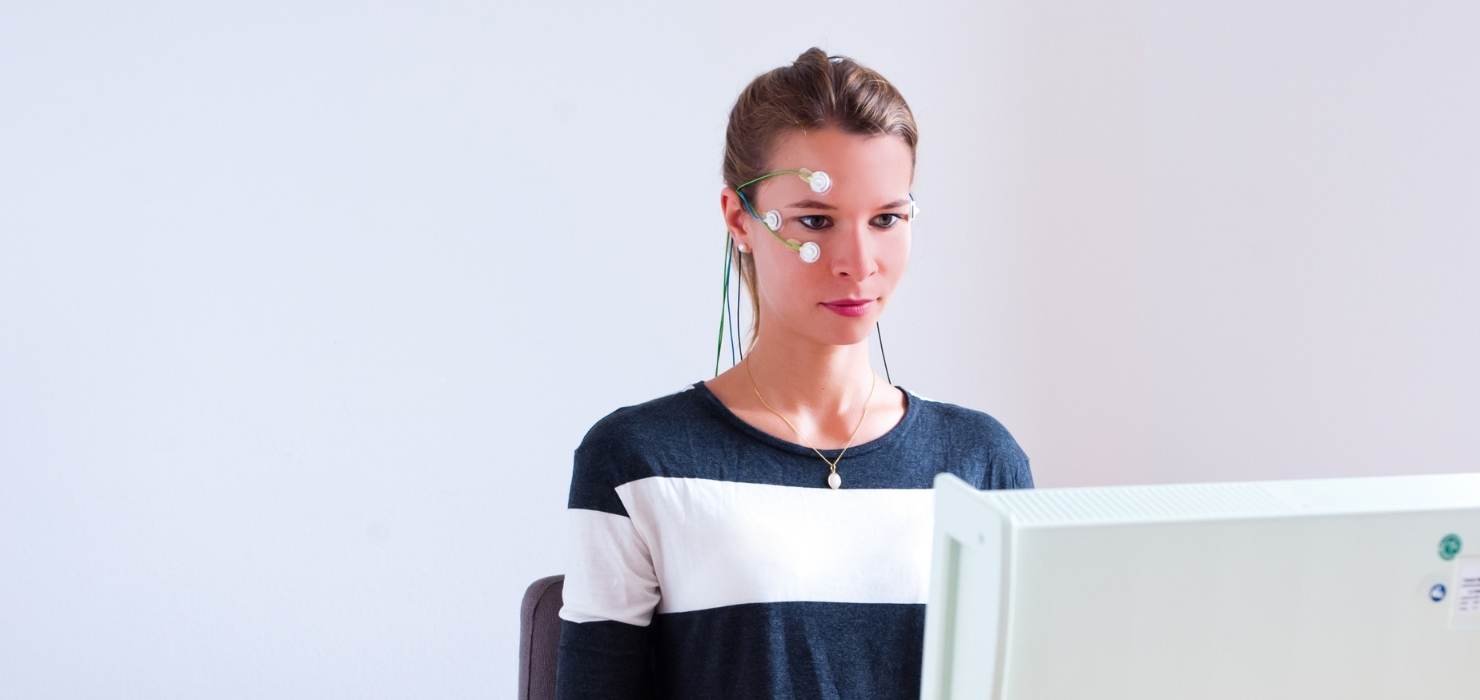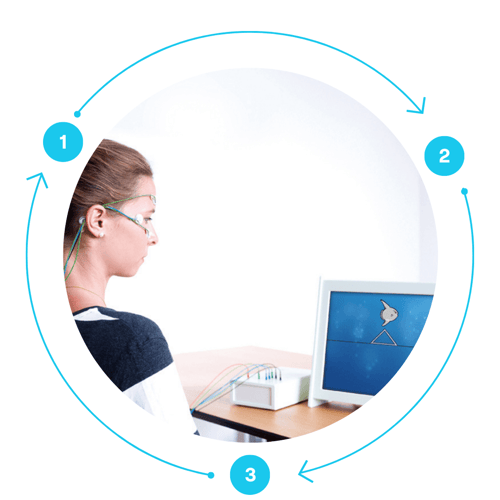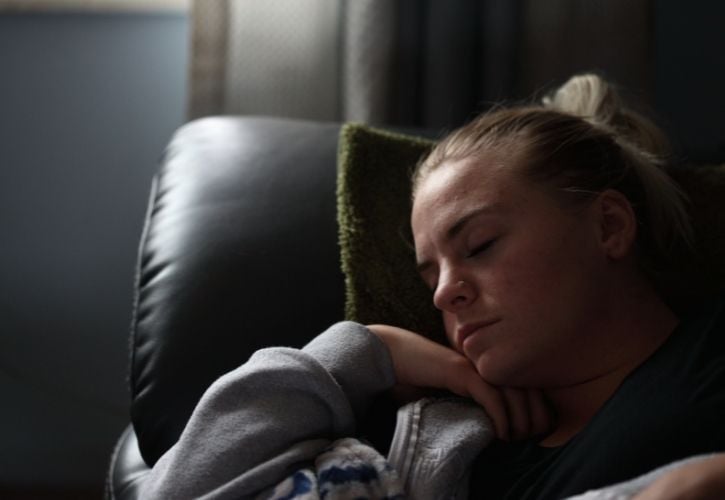Neurofeedbackfor ADHD & Sleep
Neurofeedback is a therapy backed by research to improve focus, self-regulation and sleep. It can be a sustainable treatment for ADHD, Performance or sleep problems.

Straight to:
Finding an effective treatment for ADHD or insomnia can be difficult. At neurocare, we offer alternative, non-invasive programs that deliver long-term results, without the need for ADHD medication or its side-effects.
Neurofeedback promotes optimal brain regulation by encouraging or inhibiting specific brain activity in real-time. It is a technique that has been supported by science to help those striving for peak performance or improvement of ADHD symptoms and sleep problems.
Neurofeedback 'trains the brain' to improve a client's cognitive performance or to help regulate certain brain activity. Clients attend sessions at least 2 times per week for anywhere between 30 to 40 sessions (telehealth sessions are also an option, depending on the client's location.)
After the learned brain activity has been consolidated, no further sessions are needed. Neurofeedback has the advantage that it does not require medication and studies show the effects are long-lasting.
Before starting any treatment, our trained professionals start with a thorough assessment of your brain activity and help you with your sleep hygiene. Our goal is to create a targeted program that gets your brain firing and rewiring faster, for sustained positive results.
How does Neurofeedback work?

Neurofeedback in 3 steps:
| 1. | An EEG electrode records brain activity |
| 2. | Brain activity is then visualised on a screen in real-time (e.g. the fish) |
| 3. | The client is then motivated to actively change their brain activity by responding to the visual feedback they see on the screen (some clients describe this as 'playing a game with their mind') |
Our brains are incredibly adaptable. Every day, we process and learn new information creating new neural pathways. This is known as neuroplasticity. Neurofeedback harnesses the brain’s natural ability to change, to retrain how your mind processes information. In Neurofeedback therapy for ADHD, your brain is rewarded for changing its activity to healthier patterns. Improving your brain's ability to self-regulate can help you to focus when needed during the day, as well as fall asleep and stay asleep in at night.
Who is Neurofeedback suited to?
Advantages of Neurofeedback
Safe
Neurofeedback is a non-invasive treatment as well as a form of exercise for the brain making it a safe treatment for people of all ages. neurocare performs a comprehensive assessment before administering any treatment to ensure the program will benefit your goals and circumstances.
No-side effects
Unlike medications, neurofeedback is non-invasive, well tolerated, and is not associated with any side effects.
Natural
Treatment relies on a gradual learning process, or operant conditioning, that harnesses the natural ability of the brain to change. The brain is highly adaptable and once it learns better self-regulation, these changes are maintained and built upon throughout life.
Short program duration
Neurofeedback is a structured treatment program providing sustainable outcomes. Treatment requires at least two sessions per week and a full course is normally completed within 2-3 months. Positive results can be seen as early as 3-4 weeks.
Long-lasting results
Neurofeedback uses positive reinforcement to increase the frequency of healthy patterns of brain activity. Through intensive training these patterns become automatic. Once established, the positive benefits from these new patterns is self-sustaining, and the changes long-lasting.
Supported by science
neurocare only uses treatment protocols and technologies that have been rigorously tested and researched by expert scientists and shown to be effective.
Neurofeedback for ADHD, Sleep & Performance
Neurofeedback for ADHD
Neurofeedback training has been shown to reduce hyperactive/impulsive symptoms in those with ADHD as well as improve attention and working memory. This is achieved by helping the brain learn to voluntarily regulate healthy brain states and reduce counterproductive processes (e.g. agitation, impulsivity or distraction). Once the new brain activity has been learned, the positive effects are sustained in the long term. No further sessions are needed.
Neurofeedback for ADHD is suited to children from the age of 6 years through to adults.

Neurofeedback for Insomnia and Sleep
neurocare's highly skilled teams specialize in tailoring neurofeedback therapy to effectively address sleep difficulties. Our treatment method focuses on training overactive brain states to improve self-regulation, ultimately aiding in the winding down process, enabling individuals to fall asleep faster, and promoting a restful night's sleep.
By targeting and modifying these hyperactive brain patterns, we empower individuals to naturally regulate their sleep cycles, allowing them to awake refreshed and revitalized. Rest assured that our personalized and targeted approach ensures the safe and effective use of neurofeedback therapy for anyone seeking to overcome sleep challenges.

Neurofeedback for Peak Performance
Because neurofeedback helps improve focus and sleep, this treatment is beneficial for clients looking to further improve their performance. The positive effects of neurofeedback have been documented in studies including tennis players, golfers, race car drivers, and other high-performance professionals.
Neurofeedback has no contra-indications. The treatment can be used safely for anyone, as long as its application is personalised and targeted correctly.
Frequently Asked Questions about Neurofeedback
-
Neurofeedback has been studied for several decades and prominent researcher Dr Martijn Arns and his research team, work with neurocare clinicians worldwide to ensure we deliver best practice. A quick google search on Neurofeedback may find different results on the efficacy of Neurofeedback. It is important to note there are different protocols and approaches to Neurofeedback, not all of which are backed by sufficient research. The quality of Neurofeedback equipment can also vary.
neurocare's prodocols are derived from evidence based research including the following studies:
Garcia Pimenta et al., 2021
Researchers confirmed the effectiveness of Neurofeedback when personalised with a Quantitative EEG assessment. They also demonstrated that results improve when this method is used in combination with parental interventions, psychotherapy, sleep hygiene maintenance as well as nutritional advice.Van Doren et al., 2018
In a systematic review and meta-analysis researchers looks at data from more than 500 children with ADHD from 10 randomised controlled trials, comparing the effects of Neurofeedback with ‘active treatments’ (including medication and ‘non-active’ (no treatment) conditions. They found Neurofeedback had long-lasting effects after an average of 6 months, with no ongoing therapy sessions needed after the initial program compared to the group which was still taking medication at follow-up. At the follow up, the effects of neurofeedback were comparable to the effects of medication.Arns et al., 2012
An earlier paper demonstrated the results of the ‘individualized’ neurofeedback approach – also called QEEG informed neurofeedback – which is employed at neurocare clinics worldwide. The research also found that personalised neurofeedback treatment could potentially double clinical treatment effects. -
If Neurofeedback is personalised and delivered following correct protocols, generally clients experience positive effects within the first 10 sessions of Neurofeedback, which may take 2 - 4 weeks. Neurofeedback is shown to be effective in three in four people. Our clinicians closely monitor your progress and results to improve the program in any way or to ensure you do not continue with the program if it is not working for you.
-
It is recommended to come to Neurofeedback sessions at least two times per week. If you are able to come more frequently than this, this will help you get through your treatment program in a shorter time frame.
If sessions are continuously cancelled or forgotten, and you are not coming as frequently as two times per week, ultimately you may find progress is slower and more sessions are needed.
-
Research has found Neurofeedback therapy to have sustainable effects in the longer term, with positive and large effects observed after 6 months of treatment.
In addition, results tend to improve over time, with no ongoing sessions needed after the initial program.
Essentially, once the brain has learnt the new brain activity pattern, it can then access this desired behaviour at any stage in the future, as long as the activity has been properly trained and retained. This is why frequent sessions are required with 30-40 sessions recommended in total.
-
Approximately 75 – 80% of people with ADHD or related symptoms, respond to neurofeedback. These statistics are only relevant to neurofeedback protocols which have been trailed and tested in research (such as those used at neurocare).
-
No, these electrodes are just measuring brain activity and sending that signal back into a computer.
-
Based on your intake interview a trained therapist will decide whether Neurofeedback is the right treatment for you.
A referral will be needed to access Medicare rebates under a Mental Health Care Plan (10 sessions). Please get in touch with our friendly intake team you have any questions regarding the referral.
-
In some cases, we can arrange Neurofeedback from home. It depends on the treatment protocol and other factors that will allow you to do the therapy from home.
-
Brainwaves have different patterns in different people, even within a population of people with ADHD or ADD. People with sleep disorders also show a certain brain activity. So we need to do a QEEG assessment beforehand to see which sort of brain activity you have, adn then we will be able to decide on a Neurofeedback protocol which is more likely to have a positive effect for you. Other neurofeedback providers which do not offer a complete and thorough, evidence-based QEEG assessment, may be relying on a trial-and-error approach and we do not believe this is appropriate.
-
Always talk to your prescribing doctor about reducing or stopping medication. You are still able to do Neurofeedback sessions while taking or reducing medication.
Not sure if our services are right for you?





